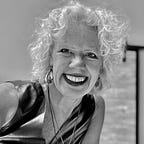Hope-Strong: How Research and Design Help Us Imagine Possibilities for Real Change
When we decided to launch Convergence Design Lab as our own woman-run independent research and design agency, we did so from a place of hope. We are hopeful for a future where we can operate a sustainable social impact enterprise — one that can honor our own histories, experiences and expertise as women, educators, artists, strategists, activists and designers.
We also hope to grow our clientele, work physically together (not just virtually again), nurture new young talent and diversify our team. But when we speak of hope in the larger sense, it is not in the vein of wishful thinking or naive optimism. Hope is a mindset, a disposition that infuses our social justice mission.
Cory Booker, intrepid civic rights advocate and US Senator, recently said:
“I think real hope is bloodied, is battered, is bruised, I think real hope has to be calloused over and scarred because hope is daring, and hope takes risks and I think that hope is muscle, it is fiber, it is sinew, it is tough. I will always choose hope..because that very choice can ignite possibilities…”
This description of hope as a muscle is a metaphor that any bodybuilder would understand. In order for muscles to build new fiber, new sinew, they must first be tried, tested and torn. So, if hope is the muscle that fuels possibilities for unlocking new change, as Booker posits, it needs to be exercised using good form.
At Convergence, we think of participatory design and research as that good form —providing the exercises, processes, routines and practices that enable our partners to fully flex their muscles of hope and imagination.
So what does this look like? First, we tailor our approach to the context and specific needs of our partners aiming toward inclusiveness. This often means that we facilitate conversation and engagement among diverse groups of participants. Second, we rely on a few core values and principles that guide our research and design process.
Each of these principles are rooted in cognitive and learning sciences, constructivism and socio-cultural theories on how people learn best in the digitally networked age. They are also anchored by good old fashioned real-world experience. These principles and questions drive our strategic approach.
Design for User Purpose | How might we situate learning and research in authentic inquiry to build ownership of learning and participatory agency?
Youth-powered inquiry: Convergence collaborated with our partner Spy Hop to launch an audience engagement initiative for their Musicology class. Students were asked what they hoped and wanted to learn from audiences at their Heatwave concert performance. The reply: we want audiences to get our lyrics — to understand what we are saying.
The lyrics to each song were printed and displayed on oversized foam boards displayed under a big tent at the concert venue. Audience members annotated the lyrics using black sharpies before, during and after the live performance. Youth were thrilled to read the comments and felt validated and empowered as a result.
Design for Depth of Understanding | How might we leverage digital methods and media that translate complex ideas and text into multimodal examples using interactive tools, games, simulations, visuals, graphics and videos that foster clarity and deeper understanding?
Check out Passion to Purpose for a playful example of this concept that allows individuals to combine their personal interests with their civic values to create a real-world, actionable design question. And open source Mentor Hats cards are a playful way to facilitate professional learning and community building with educators.
Design for Experience | How might we open up experiential pathways for the learner to actively explore new concepts through applied practice, harnessing the power of play and real-world connections?
In designing online courses for the American Library Association to build the facilitation skills of library workers in small and rural communities, we structured learning experiences as project-based learning for adults, centering the experiences of librarians and guiding participants to create tangible, engaging facilitation plans as part of the learning process.
Design for Collaborative Relationships and Reflection | How might we build structures for social learning that provide for consistent feedback from a community of peers and/or experts?
As a long-term partner of the Chicago Learning Exchange, Convergence has worked to build a community of practice structure that supports the professional learning needs of the network, positioning members as experts and resources, and creating space for individuals to build professional learning pathways.
The need for strong research and design is critical now more than ever. Within our educational spaces, our organizations, and our media and learning ecosystems, it is increasingly apparent that we need to dismantle old ways of working, teaching and communicating in favor of bold new paradigms and learning ecosystems.
Good learning design can help us get there.
While we work each day to strengthen our partners’ capacity to work through their challenges in areas of youth development, connected learning, digital literacy, civic engagement and the future of work, our sense of hope is fueled by our partners and communities with which we collaborate. It is their commitment that ultimately creates the opportunity for the kind of equity and structural changes that youth and their communities need. This is how and why we will keep striving forward and hope-strong.
Mindy Faber is the Co-Founder and Executive Director of Convergence Design Lab
Margaret Conway is the Co-Founder and Director of Learning at Convergence Design Lab
Resources:
Find Convergence Design Lab’s free and open source tools and research reports on their website — Convergence Design Lab
Sign up for Convergence’s newsletter to receive free updates here.
Follow Convergence on Twitter
